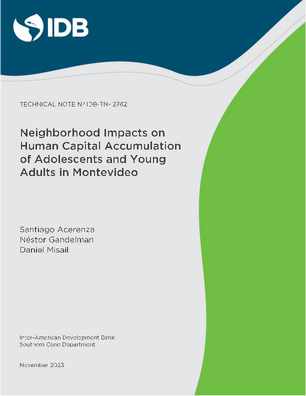Neighborhood Impacts on Human Capital Accumulation of Adolescents and Young Adults in Montevideo
Date
Nov 2023
This paper explores the causal impacts of the neighborhood of residence on education outcomes for adolescents and young adults (15-24 years old) in Montevideo. We present stylized facts on educational outcomes between 1992 and 2019. We compute transition matrixes for the neighborhood effects (conditional on individual characteristics and unconditional) and find strong path dependency and geographical segmentation between the better off southeast of the city and the worse off outskirts. We model the neighborhood effects through the neighborhood average education level. We estimate their causal impact controlling for endogeneity of the choice of residence and find statistically significant results of a relatively large magnitude. We address heterogeneity of the effects and find that neighborhood effects are stronger for boys than girls, that family income buffers neighborhood effects, and that household education level and neighborhood education level are complements.




